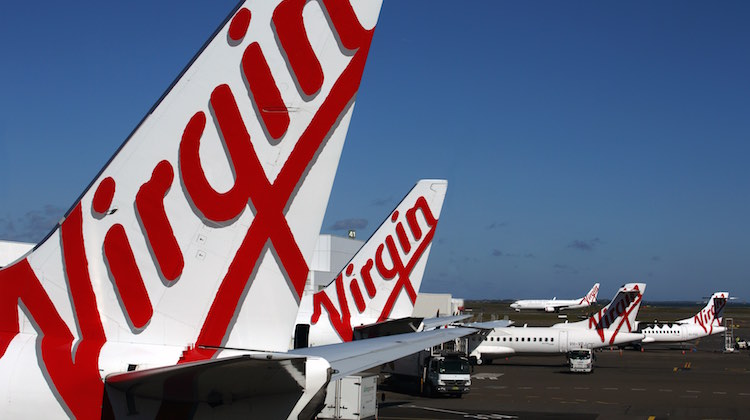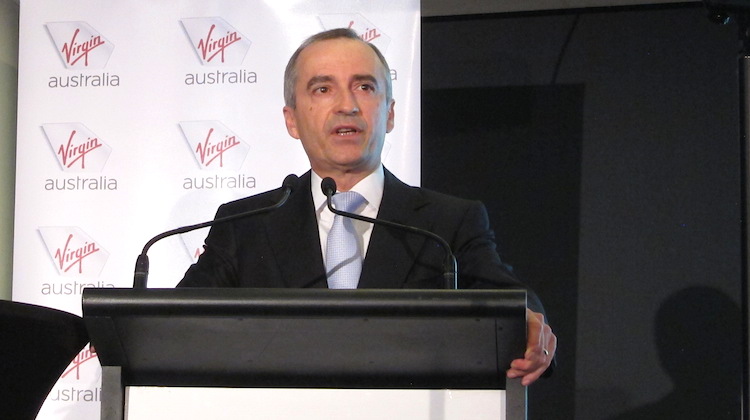
One-off charges thanks to cost-cutting and fleet-reduction efforts have pushed Virgin Australia to a $224.7 million statutory loss for 2015/16.
While the airline group’s financial performance for the 12 months to June 30 2016 was down from the statutory loss of $93.8 million in the prior year, the result includes between $410 million and $450 million in one-off charges that were previously disclosed on July 6.
Virgin said in a trading update on Thursday underlying profit before tax, which does not include one-off charges and was regarded as the best indication of financial performance, came in at $41 million for 2015/16.
The result was a turnaround from an underlying loss of $49 million in the prior year and within previously issued guidance of a result between $30 million and $60 million.
Virgin chief executive John Borghetti said the airline group managed to improve its underlying performance, grow passenger numbers and lift load factors amid a “challenging operating environment” in the fourth quarter.
“During the quarter, the group took action in response to operating conditions through strategic capacity reductions in line with demand,” Borghetti said in a statement.

As part of efforts to improve its balance sheet and reduce costs, Virgin is withdrawing all 18 Embraer E190 jets and between four and six ATR 72 turboprops over the next three years.
The airline group’s low-cost unit Tigerair Australia will also transition from an all-Airbus A320 fleet to the Boeing 737 during that time.
Moreover, the company was targeting improving operating efficiencies in crew and ground operations, as well as in maintenance, engineering, procurement and its supply chain.
Virgin’s traffic figures showed the airline reduced domestic capacity, measured by available seat kilometres (ASK), by two per cent in the fourth quarter in line with consumer demand, while revenue passenger kilometres (RPK) was up 5.8 per cent. As a result, load factors rose 5.8 percentage points to 78.5 per cent.
The airline’s domestic network carried 4.28 million passengers in the fourth quarter, up 4.6 per cent from the prior corresponding period.
There was also an improvement at Tigerair Australia, where 23.7 per cent growth in ASKs was more than matched by passenger demand, with RPKs up 28.7 per cent. As a result, load factors were up 3.3 percentage points to 85.6 per cent. The low-cost carrier carried more than one million passengers in the fourth quarter, up 15.4 per cent from the prior corresponding period.
Macquarie Securities analysts Sam Dobson and Pete Vanns said Virgin’s capacity reductions reflected a “rational response to demand weakness”.
Further, the analysts said in a research note dated July 28 the improvement in load factors highlighted a “rational, demand-led approach to capacity management”.
“While no unit revenue information was provided, we expect this contraction in capacity and boost in load factors will benefit domestic RASK (revenue per available seat kilometre),” the Macquarie analysts said.
Restructuring charges related to its cost-cutting and fleet reduction initiatives also pushed Virgin to a $228.4 million statutory loss for the fourth quarter of 2015/16, compared with a statutory loss of $17.8 million in 2014/15.
Virgin said the fourth quarter result was “impacted by previously announced charges from efficiency activities and the Better Business program, which will deliver significant, sustainable savings going forward”.
“The group is targeting net free cash flow savings increasing to $300 million per annum (annualised run rate) by the end of the 2019 financial year through the Better Business program,” Virgin said.
“In addition, the group’s existing efficiency initiatives will have delivered over $1.2 billion in cumulative cost savings by the end of the 2017 financial year.”
The airline reported an underlying loss before tax of $21.9 million for the three months to June 30 2016, up from an underlying loss of $36.9 million in the prior corresponding period.
Virgin will release its full 2015/16 financial results on August 5, but reports quarterly in line with one of its major shareholders, Singapore Airlines (SIA).
SIA, which accounts for Virgin’s financial performance in its own quarterly reporting, was due to publish its latest results later on Thursday.
Virgin shares closed unchanged at 21.5 cents on Thursday.




